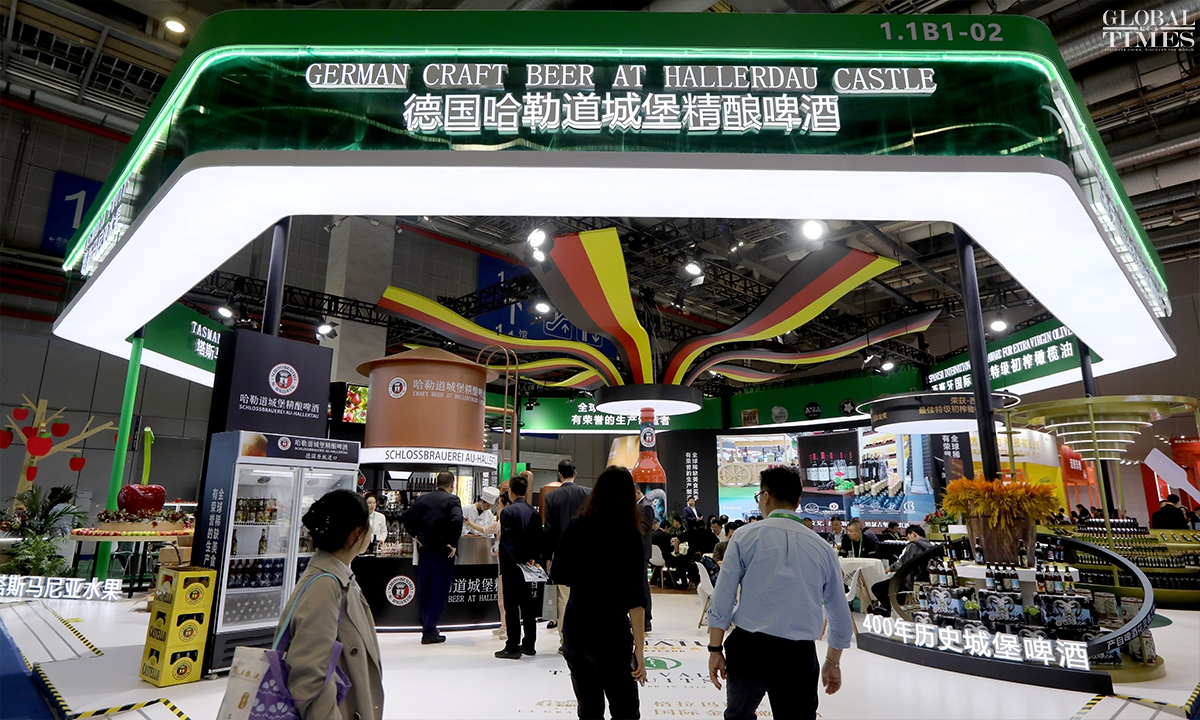
Photo: Chen Xia/GT
Companies from the EU highlight importance of Chinese opportunities during the ongoing seventh China International Import Expo (CIIE) held in Shanghai. They noted that the vast Chinese market offers huge opportunities and warmest welcome to foreign investment in China.
Recognized as a major platform for fostering global collaboration with China, companies express optimism about the potential of the Chinese market, in a contrast with the so-called de-coupling with China.
This year celebrates Beiersdorf's 30th anniversary in China. "With two state-of-the-art manufacturing sites in Shanghai and Suzhou, and our largest R&D centers for skincare and high-tech adhesives outside of Germany, showcasing Beiersdorf's strong commitment to the Chinese market," Vincent Warnery, CEO of Beiersdorf told the Global Times on Saturday.
"China is one of our key strategic markets. Chinese consumers possess robust purchasing power, and the market demonstrates a trend of consumption upgrading, providing significant opportunities for growth in our iconic brands. Our focus is on establishing a long-term presence and growing alongside the Chinese market," he added.
Held for seven consecutive years, the CIIE, which started on November 5, has long been the first place for many companies to launch their latest technological achievements. This year, more than 400 new products, technologies and services were unveiled at the CIIE.
Bayer is attending CIIE for the seventh consecutive year. Across two booths spanning a record-high 800 square meters, Bayer showcases industry-leading products and cutting-edge technologies and fosters collaboration with local partners.
Bayer said it will sign agreements with more local partners, accelerating open innovation and further exploring vast possibilities for future collaboration. This initiative aims to deepen Bayer's close ties with the Chinese market and actively contribute to the creation of a hallmark of Chinese innovation.
Yin Zheng, Executive Vice President of China & East Asia Operations with Schneider Electric also echoed that it will continue to increase its R&D investment in China, to meet the needs of the Chinese market, and export a large number of innovative results to the world.
These positive responses come as China has been actively expanding its opening-up policies in recent months. The China's Ministry of Commerce (MOFCOM) and five other Chinese government departments on November 1 released
revised regulations for foreign investment in listed companies, making it much easier for overseas investors to invest in Chinese listed firms.
"We have observed that in the past two years, China has expanded its opening-up policy in many areas by relaxing restrictions on foreign investment, lowering tariffs and expanding free trade areas," Ronan Williams, EY Consulting Business Transformation Partner told the Global Times.
China has eased restrictions on foreign investment in services like finance, communications, education and entertainment. In manufacturing, tariffs have been lowered in industries like automobiles, pharmaceuticals and medical devices, and ownership restrictions on foreign capital have been eased, and "such moves offer international investors more opportunities to operate in the Chinese market," he said.
China's economy has shifted from a phase of rapid growth to a stage of high-quality development driven by services, innovation, and consumption. Given the Chinese government's determination China is on track to achieve comprehensive and high-level opening-up in the future, said Dereck Ji, managing partner of Greater China with Arthur D. Little.
Any industry that contributes to China's development and enhances the quality of life for its residents will become a major attraction for foreign investment. This process will further promote the structural upgrading of traditional industries and the development of emerging sectors, with related industries benefiting from this transformation and upgrading, he told the Global Times.
Data from MOFCOM showed that a total of 42,108 new foreign-invested firms were established across China in the first nine months of 2024, up 11.4 percent year on year.
The hi-tech manufacturing sector secured 77.12 billion yuan ($10.74 billion), accounting for 12 percent of total FDI (foreign direct investment) inflow, marking a 1.5 percentage point increase from last year. FDI into medical equipment and instrument manufacturing saw a notable 57.3 percent increase, while inflows into computer and office device manufacturing grew by 29.2 percent during this period.
French industrial software company Dassault Systèmes recently launched a joint venture with a Chinese architectural design firm in Wuhan, Central China's Hubei Province, to accelerate digital transformation in the urban construction sector—a fresh example of Sino-French cooperation.
Pascal Daloz, Dassault's CEO since January, affirmed the company's commitment to strong investments in China and to pioneering new industry standards.
The joint venture will focus on developing urban lifecycle management solutions, leveraging Dassault Systèmes' 3DExperience platform, known for its engineering and innovation management capabilities, to drive technological advancement in the sector.




